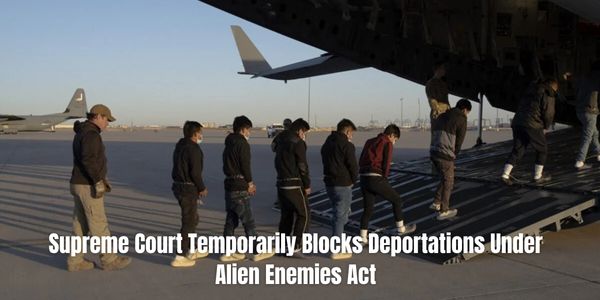In a significant development early Saturday, the U.S. Supreme Court issued an emergency order temporarily halting the Trump administration’s efforts to deport Venezuelan migrants detained in northern Texas under the rarely used 18th-century Alien Enemies Act (AEA). The order directs the government not to remove any detainees from the Bluebonnet Detention Center in Anson, Texas, “until further order of this court,” effectively pausing deportations while the Court considers an urgent appeal filed by the American Civil Liberties Union (ACLU).
Background and Legal Context
The Alien Enemies Act of 1798 allows the government to expeditiously deport non-citizens during times of declared war or invasion. The Trump administration has invoked this law to target Venezuelan migrants alleged to be affiliated with the Tren de Aragua gang, which it claims is operating as a foreign threat within the United States. The administration began deportations under this act in mid-March 2025, swiftly removing hundreds of men to a notorious prison in El Salvador known as CECOT, a facility criticized for brutal conditions.
ACLU Emergency Appeal and Due Process Concerns
The ACLU filed an emergency appeal to the Supreme Court after multiple attempts to halt the deportations in lower courts failed. The organization warned that detainees were being pressured to sign English-language documents they could not understand, labeling them as gang members without individualized evidence. Lawyers reported that some detainees had already been loaded onto buses for imminent deportation, with little to no opportunity to contest their removal or seek judicial review.
The Supreme Court had previously ruled that deportations under the Alien Enemies Act could only proceed if detainees were given a meaningful chance to challenge their removals through habeas corpus and were provided “reasonable time” and adequate notice to do so. The ACLU argued that the government’s current procedures violated the Fifth Amendment’s Due Process Clause, which guarantees that no person—citizen or alien—can be deprived of liberty without due process of law.
MUST READ: Google Found Guilty of Illegal Monopoly in Online Ad Tech
MUST READ: The Great AIdea Heist: How AI is Turning Everyday People into Creative Geniuses
Supreme Court Order and Dissent
The brief order from the Supreme Court instructs the government to halt all removals of the affected detainees until further notice. Justices Clarence Thomas and Samuel Alito dissented from the decision, signaling ongoing divisions within the Court on the issue.
Bluebonnet Detention Center’s Role
The Bluebonnet Detention Center, located in Anson, Texas, about 200 miles west of Dallas, has become the focal point of this legal and humanitarian crisis. The facility, operated by Management and Training Corporation (MTC), has been used to concentrate Venezuelan detainees from across the country in preparation for deportation under the AEA. Attorneys have reported that detainees were given notices only in English and told that the deportations were imminent, with some being moved onto buses late Friday night before the Supreme Court’s intervention.
Broader Implications
This case highlights the constitutional tensions between national security claims and the due process rights of immigrants. The government maintains that the deportations are justified by counterterrorism concerns related to the alleged gang activity of Tren de Aragua. However, legal experts and immigrant advocates argue that many detainees lack credible evidence of gang affiliation and are being denied fundamental legal protections.
The Supreme Court’s temporary block provides critical breathing room for detainees to seek judicial review and challenges the administration’s broad interpretation of a centuries-old law to expedite deportations without adequate safeguards.
Statements from ACLU
Lee Gelernt, a lawyer for the ACLU, expressed relief at the Supreme Court’s decision:
“We are deeply relieved that the Court has temporarily blocked the removals. These individuals were in imminent danger of spending the rest of their lives in a brutal Salvadoran prison without ever having had any due process.”
This legal battle continues to unfold as the Supreme Court prepares to address the broader constitutional questions raised by the use of the Alien Enemies Act in modern immigration enforcement. Meanwhile, detainees at Bluebonnet and other facilities remain in legal limbo, awaiting their chance to challenge the government’s actions in court.
For more updates on this developing story, stay tuned to TheInterviewTimes.com.

